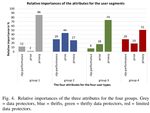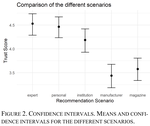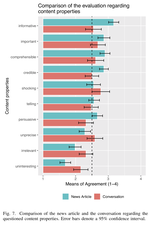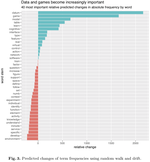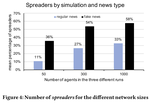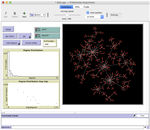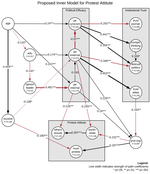Digitale Mündigkeit
Sep 23, 2018

Project website: https://www.digitale-mündigkeit.de
André Calero Valdez
Professor of Human-Computer Interaction and Usable Safety Engineering
I am insterested in studying effects human-algorithm interaction and their impact on safety.
Related
- Human Factors in the Age of Algorithms. Understanding the Human-in-the-loop Using Agent-Based Modeling
- Political Opinions of Us and Them and the Influence of Digital Media Usage
- The diversity of why: a meta-analytical study of usage motivation in enterprise social networks
- User Groups and Different Levels of Control in Recommender Systems
- Cyber - Space Perception in Cyberspace
Publications
Human and algorithmic contributions to misinformation online-identifying the culprit
In times of massive fake news campaigns in social media, one may ask who is to blame for the spread of misinformation online. Are …
André Calero Valdez
Computational Methods in Professional Communication
The digitization of the world has also led to a digitization of communication processes. Traditional research methods fall short in …
André Calero Valdez, Lena Adam, Dennis Assenmacher, Laura Burbach, Malte Bonart, Lena Frischlich, Philipp Schär
Hey, Siri, Ok, Google, Alexa. Acceptance-Relevant Factors of Virtual Voice-Assistants
Today, virtual voice-assistants are used for manifold purposes. Besides their promising potential, many users are concerned about their …
Laura Burbach, Patrick Halbach, Nils Plettenberg, Johannes Nakayama, Martina Ziefle, André Calero Valdez
Trust in Cyber Security Recommendations
Over the last two decades, the Internet has established itself as part of everyday life. With the recent invention of Social Media, the …
Johannes Nakayama, Nils Plettenberg, Laura Burbach, Patrick Halbach, Martina Ziefle, André Calero Valdez
Would I Lie to You? How Users Evaluate Faked Online Content Depending on Its Publication Type
Since the unexpected outcome of the 2016 US elections and the Brexit referendum, the term fake news mutated to an almost daily …
Patrick Halbach, Laura Burbach, Johannes Nakayama, Nils Plettenberg, Martina Ziefle, André Calero Valdez
Bubble Trouble: Strategies Against Filter Bubbles in Online Social Networks
In the recent past, some electoral decisions have gone against the pre-election expectations, what led to greater emphasis on social …
Laura Burbach, Patrick Halbach, Martina Ziefle, André Calero Valdez
Follow me: The Impact of Opinion Majorities in Social Networks and the Role of Digital Maturity
The emergence of social media platforms like Facebook and their success in connecting people changed not only the way people interact …
Patrick Halbach, Laura Burbach, Martina Ziefle, André Calero Valdez
Towards an Understanding of Opinion Formation on the Internet: Using a Latent Process Model to Understand the Spread of Information on Social Media
Understanding what drives the process of opinion formation has been studied since the 1960s. With the advent of the social web, this …
Laura Burbach, Poornima Belavadi, Patrick Halbach, Nils Plettenberg, Johannes Nakayama, Martina Ziefle, André Calero Valdez
Trends and Changes in the Field of HCI the Last Decade from the Perspective of HCII Conference
In order to identify trends and changes in the field of HCI, we used the full-texts of the papers of the HCII conferences from 2007 to …
André Calero Valdez, Martina Ziefle
Attitude - mHealth Apps and Users' Insights: An Empirical Approach to Understand the Antecedents of Attitudes towards mHealth Applications
Mobile health apps are a solution to make people more self-sufficient with their health in relation to their lifestyle or medical …
Luisa Vervier, André Calero Valdez, Martina Ziefle
Who Shares Fake News in Online Social Networks?
Today more and more people use social networks and so the differences in personalities of users become more diversified. The same holds …
Laura Burbach, Patrick Halbach, Martina Ziefle, André Calero Valdez
What happens when decision support systems fail? — the importance of usability on performance in erroneous systems
With the advent of artificial intelligence (AI) methods, smart decision support systems (DSSs) are becoming ubiquitous. Such systems …
Philipp Brauner, Ralf Phillipsen, André Calero Valdez, Martina Ziefle
Predicting Acceptance of Novel Technology from Social Network Data - An Agent-based Simulation-Approach
With digitization of production technology changes in technology infrastructure will become more frequent and more important for the …
André Calero Valdez, Martina Ziefle
Political Opinions of Us and Them and the Influence of Digital Media Usage
Democracies in the late 2010s are threatened by political movements from the borders of the political spectrum. Right-wing populist …
André Calero Valdez, Laura Burbach, Martina Ziefle
Similarity of Search Results in the Datenspende BTW17 Dataset - CSS Data Challenge 2018
The filter bubble theory, popularized by Eli Pariser in 2011 is subject of academic discussion. With political polarization seemingly …
Johannes Nakayama, Nils Plettenberg, Laura Burbach, André Calero Valdez
User preferences in recommendation algorithms: the influence of user diversity, trust, and product category on privacy perceptions in recommender algorithms
The use of recommendation systems is widespread in online com- merce. Depending on the algorithm that is used in the recommender system …
Laura Burbach, Johannes Nakayama, Nils Plettenberg, Martina Ziefle, André Calero Valdez
Believability of News - Understanding Users Perceptions of Fake News and the Effectiveness of Fact-Checking Badges
When social media becomes a dominant channel for the distribution of news, manipulation of the news agenda and news content can be …
André Calero Valdez, Martina Ziefle
Human Factors in the Age of Algorithms. Understanding the Human-in-the-loop Using Agent-Based Modeling
The complex interaction of humans with digitized technology has far reaching consequences, many of which are still completely opaque in …
André Calero Valdez, Martina Ziefle
Political Opinions of Us and Them and the Influence of Digital Media Usage
Democracies in the late 2010s are threatened by political movements from the borders of the political spectrum. Right-wing populist …
André Calero Valdez, Laura Burbach, Martina Ziefle
Elitism, trust, opinion leadership and politics in social protests in Germany
Energy infrastructure projects often bring along protests. Protests as a form of political participation reveal perceptions of locals …
André Calero Valdez, Johanna Kluge, Martina Ziefle
Talks
Human-Algorithm Interaction at Data Community Meetup Deutsche Bahn
Feb 18, 2020 —
Steigerwaldstadion Erfurt
André Calero Valdez
Human-Algorithm Interaction at Dataviscamp 2020
Dataviscamp is a new initiative with focus on datavisualization: We bridge the gap between data and humans.
Feb 17, 2020 —
Brightlands Smart Services Campus
André Calero Valdez
Human and algorithmic contributions to disinformation in social media. Identifying the culprit.
Feb 27, 2019 00:15 AM
Hamburg, Germany
Predicting Acceptance of Novel Technology from Social Network Data
Jan 26, 2019 22:55 PM
Stellenbosch, South Africa
Trump, Brexit und die AFD – Verändert Facebook unsere Demokratie?
Sep 26, 2018 22:59 PM
Aachen, germany
Trump, Brexit und die AFD – Verändert Facebook unsere Demokratie?
Sep 26, 2018 22:59 PM
Aachen, Germany
Human Factors in the Age of Algorithms. Understanding the Human-in-the-loop Using Agent-based Modeling
Sep 26, 2018 22:59 PM
Las Vegas, USA

